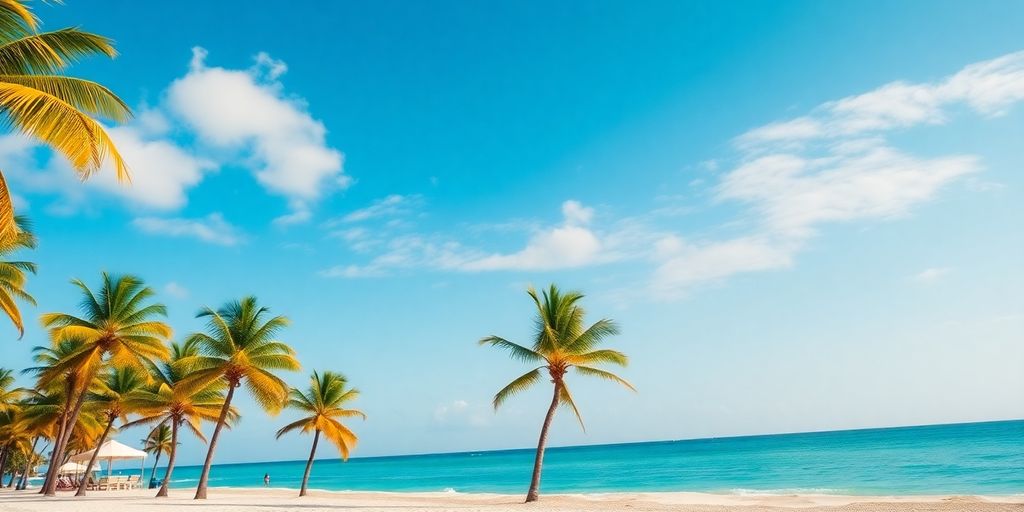Exploring Countries Without Income Tax: Your Guide to Tax-Free Living in 2025

Ever thought about living in a place where income tax is just not a thing? Sounds like a dream, right? Well, in 2025, it’s totally possible. Some countries have figured out how to run their economies without dipping into their residents’ pockets. This guide is here to help you explore these tax-free havens, understand how they work, and see if moving to one could be your next big adventure.
Key Takeaways
- Some countries don’t charge income tax, making them appealing for those looking to save money.
- These nations often rely on tourism, natural resources, or other taxes to fund their governments.
- Living in a tax-free country doesn’t mean zero costs; other expenses can still be significant.
- Choosing between tax-free and low-tax countries depends on personal financial goals and lifestyle preferences.
- Establishing residency in a tax-free country can be straightforward, but it’s essential to understand legal and financial implications.
Understanding Countries Without Income Tax
Defining Tax-Free Nations
A country without income tax is a unique phenomenon in the global landscape. These nations do not levy taxes on individual earnings, allowing residents to keep all of their income. This can be a huge draw for those looking to maximize their earnings. It’s important to note that these countries often have alternative forms of taxation to fund government operations, like value-added taxes (VAT), import duties, or property taxes.
How Do These Countries Generate Revenue?
So, how do these countries keep their economies running without income tax? Many rely on other sources of revenue. For instance, some nations, like certain regions in the Middle East, benefit from abundant natural resources like oil. Others, such as the Bahamas and Maldives, capitalize on thriving tourism industries. Here’s a quick breakdown:
- Natural Resources: Countries like Oman and Qatar harness oil revenues.
- Tourism: Destinations like the Bahamas thrive on tourist dollars.
- Value-Added Taxes: Many tax-free countries implement VAT on goods and services.
Common Misconceptions About Tax-Free Living
Living in a country with no income tax might seem like a financial paradise, but there are misconceptions. One common myth is that no income tax means no taxes at all. In reality, governments still need funds for infrastructure and services, so they find other ways to generate revenue. Another misconception is that these countries are only for the wealthy. While they do attract high-net-worth individuals, anyone can potentially enjoy the benefits of tax-free living if they meet residency requirements.
Living in a tax-free country offers financial freedom, but it’s essential to understand the full scope of what it entails. From alternative taxes to lifestyle changes, it’s not just about saving money but also adapting to a different way of life.
Top Destinations for Tax-Free Living
Caribbean Havens: Sun and Savings
The Caribbean is not just about stunning beaches and tropical vibes. It’s also a hotspot for those looking to live tax-free. Countries like the Bahamas and the Cayman Islands offer no personal income tax, making them attractive for expats. Imagine sipping a cocktail while knowing your earnings are untouched by the taxman. These islands generate revenue through tourism and offshore financial services, so while you enjoy the sun, the country keeps its economy afloat.
Middle Eastern Opportunities
The Middle East offers some of the most appealing options for tax-free living. The United Arab Emirates, especially Dubai and Abu Dhabi, has become a go-to for many seeking a tax-free lifestyle. Here, there’s no personal income tax, and with a booming economy, the UAE is a magnet for businesses and expats alike. With its strategic location and world-class infrastructure, it’s not just about avoiding taxes; it’s about thriving in a dynamic environment.
Asian Gems for Tax-Free Living
Asia, too, has its share of tax-free havens. Brunei, for instance, doesn’t impose personal income tax, thanks to its oil and gas wealth. While the Maldives might not be the easiest place to settle long-term, its lack of income tax makes it an attractive short-term option. Living in these places means you can enjoy a high standard of living without the tax burden, though it’s essential to consider factors like residency requirements and lifestyle adjustments.
The Economic Impact of No Income Tax
How Governments Compensate for Lost Revenue
Countries without an income tax have to get creative when it comes to revenue generation. They can’t just sit back and hope for the best. Instead, they often rely on other sources like natural resources, tourism, or VATs (Value Added Taxes). For instance, places like Qatar and Oman have oil and gas to thank for their wealth. These natural resources bring in enough cash that they can skip the whole income tax thing. On the other hand, countries like the Bahamas and Maldives make their money through tourism. People flock there for the beaches and sun, and in turn, spend a lot of money, which helps keep the government’s coffers full.
The Role of Natural Resources and Tourism
In some countries, natural resources are the big moneymakers. Oil-rich nations, for instance, can afford to not tax personal income because they have significant revenue from oil exports. This is a big reason why places like Brunei and Kuwait don’t need to tax their residents’ incomes. Then there’s tourism. Countries like the Maldives and the Bahamas have turned their natural beauty into a cash cow. Tourists come, spend money, and leave, and this spending supports the local economy and government.
Attracting High Net-Worth Individuals
Without income tax, countries become magnets for the wealthy. These high-net-worth folks are looking to save money, and living in a tax-free country is a pretty sweet deal. They bring their wealth, invest in local businesses, and buy property. This influx of cash can boost the economy significantly. Plus, these individuals often spend heavily, which means more money circulating within the country. It’s a win-win: the wealthy get to keep more of their earnings, and the country benefits from increased economic activity.
Living in a tax-free country can be a strategic move for those looking to maximize their wealth. It’s not just about saving money; it’s about creating opportunities and fostering economic growth. The ripple effects can be felt throughout the entire economy, from job creation to increased spending in local businesses.
By understanding these dynamics, you can see why some countries choose to forgo income tax and how they manage to thrive without it.
Comparing Tax-Free and Low-Tax Countries
Understanding the Differences
When it comes to choosing between tax-free and low-tax countries, the main difference lies in the tax structure. Tax-free countries, as the name suggests, do not impose taxes like personal income tax, capital gains tax, or corporate tax. Meanwhile, low-tax countries offer reduced tax rates, often on local income only, making them attractive for those with international income streams. Choosing the right option depends on your financial goals and lifestyle preferences.
Pros and Cons of Each Option
Here’s a quick look at the advantages and disadvantages of each:
Tax-Free Countries
- Pros:
- No income tax allows for potentially higher savings and investments.
- Simplified tax compliance due to fewer tax obligations.
- Often attract a vibrant expat community seeking favorable financial conditions.
- Cons:
- High cost of living in some locations, like Monaco or the Cayman Islands.
- Strict residency requirements can be a barrier for some.
- Limited economic diversity might make these countries vulnerable to economic changes.
Low-Tax Countries
- Pros:
- Moderate tax relief while maintaining access to solid infrastructure.
- Easier residency paths with lower investment requirements.
- Economic stability often supported by diversified industries.
- Cons:
- Partial tax obligations still exist, such as VAT or social security.
- Residency may require longer physical presence.
- Complex tax codes can be challenging to navigate.
Choosing the Right Fit for Your Lifestyle
Deciding between a tax-free or low-tax country requires careful consideration of several factors:
- Financial Goals: Evaluate your income sources and tax obligations in potential countries.
- Residency Requirements: Understand the legal and financial commitments needed to establish residency.
- Cost of Living: Consider how living expenses align with your budget and lifestyle.
Ultimately, the choice between tax-free and low-tax living is personal. It hinges on your financial situation, lifestyle preferences, and long-term plans. Weigh the pros and cons carefully to find the best fit for your needs.
Residency and Citizenship in Tax-Free Countries

Easiest Countries to Establish Residency
Finding a place to call home in a tax-free country can be a bit of a puzzle. But, some countries make it easier than others. Monaco is a favorite for many, offering a straightforward path to residency. All you need is proof of financial independence and a place to stay. The Bahamas is another great option, where investing in real estate can secure you a permanent residency. The process is pretty quick if you invest a bit more. Then there’s the UAE, where a real estate investment can get you a renewable residency visa.
Investment Requirements and Opportunities
If you’re thinking about moving to a tax-free country, you’ll likely need to open your wallet. Here’s a simple table to help you understand some of the costs:
| Country | Investment Type | Minimum Investment |
|---|---|---|
| Monaco | Bank Deposit & Housing | $540,000+ |
| Bahamas | Real Estate | $750,000+ |
| UAE | Real Estate | $270,000+ |
It’s not just about the money, though. Some places want to see that you’re genuinely interested in being part of the community. So, having a business or contributing to the local economy can be a big plus.
Legal Considerations and Compliance
Living in a tax-free country sounds like a dream, but there are rules to follow. Each country has its own set of laws, and keeping up with them is key. You might need to spend a certain amount of time in the country each year to keep your residency. Also, be aware of any agreements between your home country and the tax-free country, as these can affect your tax obligations.
Moving to a tax-free country isn’t just about escaping taxes; it’s about embracing a new lifestyle and playing by the local rules. Make sure you’re ready for the change and understand what you’re signing up for.
So, if you’re ready to take the plunge into tax-free living, make sure you do your homework. It’s not just about finding the right country, but also about understanding the commitments and opportunities that come with it.
Living in a Tax-Free Country: What to Expect
Cost of Living Considerations
Moving to a country without income tax might seem like a dream come true, but it’s important to weigh the cost of living. While you might save on taxes, other expenses could be higher. For instance, housing and groceries might be pricier in places like the Cayman Islands or Monaco. It’s crucial to balance the tax savings with these potential costs. Here’s a quick look at some common expenses:
| Country | Average Rent (1-Bedroom) | Grocery Cost (Monthly) |
|---|---|---|
| Monaco | $3,500 | $500 |
| Cayman Islands | $2,000 | $400 |
| Bahamas | $1,800 | $350 |
Cultural and Lifestyle Adjustments
Living in a new country means adapting to its culture and lifestyle. In places like the UAE, you’ll experience a mix of traditional and modern influences. The hustle and bustle of cities such as Dubai can be exciting, but also overwhelming. Embrace the change by learning local customs and maybe even picking up some of the language. It’s all part of the adventure!
Potential Challenges and Solutions
No place is perfect, and living in a tax-free haven comes with its own set of challenges. You might face issues like limited residency options or strict legal requirements. For example, countries like Kuwait have stringent rules for permanent residency. Here are some tips to tackle these challenges:
- Research Thoroughly: Understand the residency and citizenship rules before moving.
- Consult Professionals: Engage with legal and financial advisors to navigate the complexities.
- Stay Informed: Keep up with any changes in local laws that might affect your status.
Moving to a tax-free country is more than just a financial decision; it’s a lifestyle choice. Be prepared for both the perks and the hurdles, and you’ll find the transition much smoother.
Strategic Planning for Tax-Free Living

Financial Planning and Asset Protection
Diving into a tax-free lifestyle requires a solid financial plan. It’s crucial to map out your finances to ensure you’re maximizing the benefits of living in a tax-free country. Consider hiring a financial advisor who specializes in international tax laws to help protect your assets. They can guide you on diversifying your investments globally, so you’re not putting all your eggs in one basket.
Navigating Double Taxation Agreements
Living in a tax-free country doesn’t automatically exempt you from taxes elsewhere. Many countries have double taxation agreements (DTAs) that can affect your tax obligations. It’s essential to familiarize yourself with these agreements to avoid any surprises. Here’s a quick checklist:
- Identify countries with which your new home has DTAs.
- Understand the tax implications of these agreements.
- Consult with a tax professional to ensure compliance.
Long-Term Residency and Citizenship Strategies
If you’re planning on staying long-term, consider the residency and citizenship options available. Some countries offer citizenship by investment, which might be a viable path for you. Weigh the pros and cons of each option and think about your long-term goals.
Establishing residency in a tax-free country can open up new opportunities for personal growth and financial freedom. However, it’s important to be aware of the legal requirements and potential challenges involved.
Taking the leap to live in a tax-free country is more than just about saving money. It’s a lifestyle change that requires careful planning and consideration. Make sure you’re prepared for the journey ahead.
Conclusion
So, there you have it. Living in a country without income tax might sound like a dream come true, but it’s not all sunshine and rainbows. Sure, you get to keep more of your hard-earned cash, but remember, these places have their own quirks and challenges. Whether it’s the cost of living, the lifestyle, or even the hoops you have to jump through to get residency, there’s a lot to consider. It’s not just about the money; it’s about finding a place that feels like home. So, take your time, do your homework, and maybe, just maybe, you’ll find your perfect tax-free paradise.
Frequently Asked Questions
Why do some countries not charge income tax?
Some countries don’t charge income tax because they earn money in other ways, like from natural resources or tourism. This helps them fund their needs without taking money from people’s paychecks.
Is it easy to move to a country without income tax?
Moving to a country without income tax can be tricky. Some places have easy residency options, but others might require big investments or have strict rules.
Do I have to live in a country all year to avoid income taxes there?
Not always. Many countries use the 183-day rule, which means if you live there for more than half the year, you might not have to pay income taxes elsewhere.
Can I really save money by living in a tax-free country?
Yes, living in a tax-free country can save you money on taxes. However, you should also consider other costs like living expenses and lifestyle changes.
Are there downsides to living in a tax-free country?
There can be downsides, like higher costs in other areas or fewer public services. It’s important to weigh the pros and cons before making a move.
What should I consider before moving to a tax-free country?
Before moving, think about the cost of living, cultural differences, and legal rules. It’s also wise to plan your finances and understand any tax agreements with your home country.







Responses